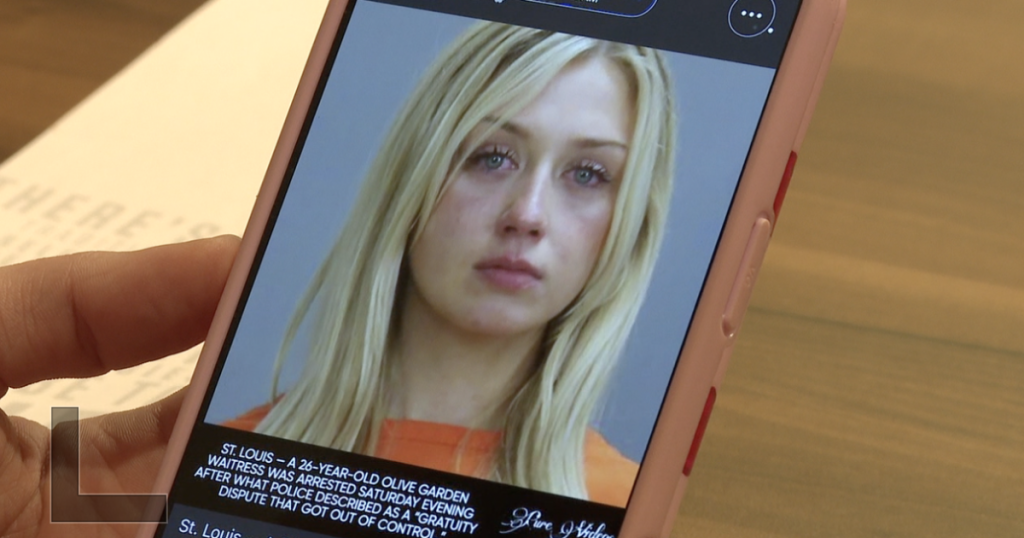Listen to the article
College Station student battles viral AI hoax after mugshot repurposed for fake Olive Garden attack
A College Station, Texas student has become an unwitting victim of digital misinformation after discovering her mugshot was used to create a completely fabricated viral story that spread to millions of people online.
Megan Davis was shocked to find her image from a months-old public intoxication arrest had been repurposed in a fake news story claiming she was a St. Louis waitress who attacked Olive Garden customers with breadsticks.
“If you Google my name, this will pop up, like the entire story, the mugshot, and I mean it’s gonna forever be out there now,” Davis told local media, visibly distressed by the situation. “The first moment I saw it, I just started crying and I called my friend and sent them the screenshot and was like, what do I do?”
The fabricated story gained alarming traction on social media platforms, reaching tens of thousands of viewers within hours. “By the end of the day we had hit like 80,000. Within a couple days, millions had seen it, and it was shared everywhere,” Davis explained.
Despite Olive Garden confirming Davis has never been an employee and Davis herself posting statements debunking the story, the misinformation continues to circulate. “With that mugshot and that story being used, people still are choosing to believe it,” she said, highlighting the persistent challenge of correcting false information once it gains momentum online.
Digital misinformation experts warn that Davis’s experience represents a growing trend facilitated by artificial intelligence tools that can generate convincing fake narratives in seconds. Alex Del-Carmen, a criminologist at Tarleton State University who studies digital misinformation, explains the vulnerability of online content.
“Things that you may find online are an easy prey for individuals that are gonna basically manufacture reality and use artificial intelligence to do so,” Del-Carmen said. The rapid evolution of AI-powered content creation has outpaced legal protections for victims like Davis.
This case highlights a significant gap in current legal frameworks. Del-Carmen notes that victims of digital hoaxes often have limited recourse: “By the time it’s said and done, you have the damage, you have the victim, but there’s no bad guy that you can trace it back to.” The anonymous and borderless nature of internet content creation makes accountability difficult to establish.
The incident raises important questions about mugshot accessibility and public records in the digital age. Arrest photos, which remain publicly available regardless of conviction status in many jurisdictions, have become particularly vulnerable to misuse in the era of generative AI and viral social media.
For Davis, the experience has been transformative in troubling ways. What started as a minor legal issue has morphed into a persistent online reputation crisis that could affect her future employment prospects, relationships, and mental well-being. The emotional toll has been significant, yet she’s determined to use her experience constructively.
“I don’t understand how this even happened, but it can happen. It can happen to legit anybody,” Davis warned. “You have to fight, otherwise it’s gonna eat you alive.” She plans to create content across social media platforms to raise awareness about digital misinformation and provide support to others who might face similar situations.
Media literacy experts recommend that consumers approach unusual or sensational news stories with heightened skepticism, particularly those that originate from unfamiliar sources or lack verification from established news organizations. They also suggest checking official company statements and reverse image searching suspicious photos before sharing content.
Davis’s case serves as a sobering reminder of how quickly misinformation can spread and the lasting impact it can have on its victims, even when definitively proven false. As AI tools become more accessible and sophisticated, incidents like this are likely to increase, raising urgent questions about digital ethics and regulatory frameworks in the information age.
Fact Checker
Verify the accuracy of this article using The Disinformation Commission analysis and real-time sources.




7 Comments
This is a sobering example of how misinformation can spread rapidly online, even when it involves an innocent person’s image. It’s concerning that Megan Davis’ mugshot was repurposed for a completely fabricated story without her consent. I hope she’s able to get the situation under control and minimize the long-term impact on her life.
This is a disturbing example of how quickly misinformation can spread online, especially when it involves misusing someone’s personal information. I feel for Megan Davis and hope she’s able to get the false story taken down and limit the damage to her reputation. Platforms need better safeguards against this kind of exploitation.
This is a cautionary tale about the dangers of online misinformation. While Megan Davis did nothing wrong, her mugshot has now been spread widely as part of a fabricated story. I hope she’s able to get some resolution and control the damage to her reputation.
Yes, it’s a disturbing violation of privacy. Megan Davis seems to be handling this with grace, but the situation must be incredibly stressful. Platforms need to do more to prevent this kind of misuse of personal information.
What a distressing situation for this college student. Having your personal information and image misused in a viral hoax must be incredibly upsetting. I hope Megan Davis is able to work with the platforms and authorities to get the false story taken down as quickly as possible.
Absolutely, this kind of exploitation of someone’s personal information is just wrong. Megan Davis deserves support in dealing with the fallout from this incident.
Wow, that’s a really tough situation for this student. Having your personal details and mugshot used in a completely fake viral story must be so upsetting and stressful. I hope Megan Davis is able to get the false information removed from the internet as much as possible.